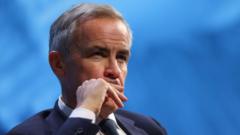The political landscape in Canada is in flux following Prime Minister Justin Trudeau’s announcement that he will step down after nearly a decade in office, amidst mounting pressures and declining public support. Mark Carney, the former governor of both the Bank of Canada and the Bank of England, has signaled he is "considering" the possibility of running for the Liberal Party leadership position once Trudeau vacates the role.
Mark Carney Mulls Run for Canada's Liberal Leadership as Trudeau Steps Down

Mark Carney Mulls Run for Canada's Liberal Leadership as Trudeau Steps Down
As Prime Minister Justin Trudeau prepares to resign, former Bank of Canada governor Mark Carney is contemplating a bid for the Liberal leadership.
Trudeau made his intentions known earlier this week, stating he would remain in office until a successor is chosen, with the Canadian parliament currently prorogued and set to resume on March 24. Despite his departure, Trudeau's announcement coincides with a tumultuous period for his party, as they grapple with poor polling results and growing discontent among members. Carney, who leads an asset management firm and previously served as an advisor to Trudeau, mentioned in an interview with the Financial Times that he will be discussing his potential candidacy with family over the coming days.
While Carney's lack of elected office experience may raise eyebrows, he is recognized for his economic expertise gained during his tenure as a central banker, guiding both Canada and the UK through significant financial crises. His extensive background in economic strategy and environmental advocacy, positioning him as the United Nations special envoy on climate action, aligns with the Liberal narrative but has faced criticism from conservative factions, particularly regarding the federal carbon tax policy. Carney’s prior encounters with Trudeau included discussions about joining his cabinet as finance minister, a reflection of his perceived value in the political arena.
Additionally, the Liberal Party is also witnessing interest from other prominent figures such as Chrystia Freeland, Trudeau’s former deputy, and Transport Minister Anita Anand. As the timeline for leadership succession remains uncertain, the new leader will inherit the responsibility of preparing for the next federal election due by October, although an earlier vote is deemed probable. With the Conservatives currently leading in the polls under Pierre Poilievre's leadership, the unfolding political drama sets the stage for a competitive bid for leadership among potential candidates.
Amidst these shifts, analysts and supporters alike are eager to see if Carney, known for his critiques of Poilievre's leadership style as "slogans without a plan," will emerge as a transformative figure within Canadian politics. The next weeks will undoubtedly be pivotal as contenders consider their strategies in preparation for the eventual transition of power.
While Carney's lack of elected office experience may raise eyebrows, he is recognized for his economic expertise gained during his tenure as a central banker, guiding both Canada and the UK through significant financial crises. His extensive background in economic strategy and environmental advocacy, positioning him as the United Nations special envoy on climate action, aligns with the Liberal narrative but has faced criticism from conservative factions, particularly regarding the federal carbon tax policy. Carney’s prior encounters with Trudeau included discussions about joining his cabinet as finance minister, a reflection of his perceived value in the political arena.
Additionally, the Liberal Party is also witnessing interest from other prominent figures such as Chrystia Freeland, Trudeau’s former deputy, and Transport Minister Anita Anand. As the timeline for leadership succession remains uncertain, the new leader will inherit the responsibility of preparing for the next federal election due by October, although an earlier vote is deemed probable. With the Conservatives currently leading in the polls under Pierre Poilievre's leadership, the unfolding political drama sets the stage for a competitive bid for leadership among potential candidates.
Amidst these shifts, analysts and supporters alike are eager to see if Carney, known for his critiques of Poilievre's leadership style as "slogans without a plan," will emerge as a transformative figure within Canadian politics. The next weeks will undoubtedly be pivotal as contenders consider their strategies in preparation for the eventual transition of power.





















